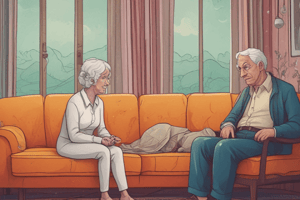Podcast
Questions and Answers
What is the concept that describes development as having both gains and losses in different areas?
What is the concept that describes development as having both gains and losses in different areas?
- Development is multidisciplinary
- Development is multidimensional
- Development is lifelong
- Development is multidirectional (correct)
What type of age is described as the actual age of an individual?
What type of age is described as the actual age of an individual?
- Psychological age
- Biological age
- Chronological age (correct)
- Social age
A 20-year-old individual with the mental capacity of an 8-year-old is an example of which type of age?
A 20-year-old individual with the mental capacity of an 8-year-old is an example of which type of age?
- Psychological age (correct)
- Chronological age
- Social age
- Biological age
Which perspective believes that heredity plays the most important role in shaping who we are?
Which perspective believes that heredity plays the most important role in shaping who we are?
Who believed that children's abilities are shaped by their environment?
Who believed that children's abilities are shaped by their environment?
What is the name of the perspective that believes that a fully formed human is implanted in the sperm or egg at conception?
What is the name of the perspective that believes that a fully formed human is implanted in the sperm or egg at conception?
Who believed that children should be allowed to think by themselves according to their own ways and inner, biological timetable?
Who believed that children should be allowed to think by themselves according to their own ways and inner, biological timetable?
Who believed that personality is formed during the first few years of life and is driven primarily by instincts?
Who believed that personality is formed during the first few years of life and is driven primarily by instincts?
What type of crises may hinder our ability to deal with later stages of development if not faced and resolved in a positive way?
What type of crises may hinder our ability to deal with later stages of development if not faced and resolved in a positive way?
Which theory best explains how young children frequently learn behaviors through imitation?
Which theory best explains how young children frequently learn behaviors through imitation?
Who developed the Social Learning Theory?
Who developed the Social Learning Theory?
Who believed that a person not only has a set of abilities, but also a set of potential abilities that can be realized if given the proper guidance from others?
Who believed that a person not only has a set of abilities, but also a set of potential abilities that can be realized if given the proper guidance from others?
At which stage of development are the major structures of the body taking form, making the organism most vulnerable to damage?
At which stage of development are the major structures of the body taking form, making the organism most vulnerable to damage?
What part of the neuron allows the child to react immediately to certain stimuli?
What part of the neuron allows the child to react immediately to certain stimuli?
Flashcards are hidden until you start studying
Study Notes
Developmental Perspective
- Development is lifelong, multidimensional, and multidirectional.
- Lifespan perspective describes gains and losses in different areas of development.
Types of Age
- Chronological age: based on birthdate (e.g., "I will turn 18 this December").
- Biological age: related to physical development (e.g., a 20-year-old with cognitive impairment of an 8-year-old).
- Psychological age: related to mental capacity and cognitive development.
- Social age: related to social and cultural norms.
Nature vs. Nurture
- Nature: heredity plays the most important role in shaping personality and features (e.g., height, weight).
- Nurture: environment and experiences shape who we are (e.g., teachers, social circle).
Theories of Development
- Preformationist View: children possess all their sensory capabilities and mental aptitude at birth, and develop according to a predetermined schedule.
- John Locke: believes that children's minds are shaped by the environment.
- Jean-Jacques Rousseau: advocates for children to think and develop independently.
- Sigmund Freud: believes that personality forms during the first few years of life, driven primarily by instincts.
Crisis and Development
- Psychological crises: challenges in life that can hinder ability to deal with later stages.
- Psychosocial crises: difficulties in life that can impact relationships and social development.
Learning Theories
- Social Learning Theory: learning behaviors through imitation (e.g., young children learning behaviors).
- Albert Bandura: developed the Social Learning Theory.
Cognitive Development
- Lev Vygotsky: believes that people have a set of abilities and potential abilities that can be realized with proper guidance.
- Jean Piaget: developed theories on teaching that have been adopted by educators.
Prenatal Development
- Embryonic period: major structures of the body are forming, and the organism is most vulnerable to damage from harmful substances.
Teratogens
- Teratogens: substances that can harm the developing fetus (e.g., cigarette, HIV, diabetes).
- Coffee: not a teratogen.
Nervous System
- Myelin sheath: speeds the rate of transmission of information of impulses, allowing the child to react immediately.
- Axon: transmits information from the neuron to other cells.
Studying That Suits You
Use AI to generate personalized quizzes and flashcards to suit your learning preferences.




